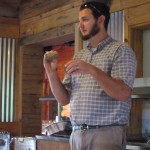The Dillon Soil and Water Conservation District in partnership with Southern States and First Citizens Bank, hosted an education session on soil health July 23rd, 2013 at Shulers Restaurant in Latta, South Carolina. For the past 2 years, the conservation district has been proactive in learning more about how multi species cover crops contribute to positive soil health and improved crop yields. With fertilizer and herbicide input cost continuing to rise, it is feasible to look at our soil health to learn as much as we can to better utilize our inputs of commercial fertilizer and herbicides. Dillon County has two major resource concerns, compacted soils and low organic matter, which significantly reduce our crop yields during times of low rainfall and excessive rainfall.
We have learned that no-till planting into a cover crop will increase organic matter, increase water conservation and increase nutrient cycling while requiring the same commercial fertilizer inputs for desired yields. Soil health is building microbial and organic chemical diversity. When this diversity is significantly improved, usage amounts of commercial fertilizers and herbicides generally are reduced. Most of our soils contain an abundance of nutrients that are unavailable to the plant root for maintenance, growth and reproduction. Increasing microbial activity such as soil bacteria and fungi increases the availability of these nutrients. A good example of this is the amount of nitrogen required for corn to produce a desired yield. The air we breathe is approximately 74% nitrogen yet none of this nitrogen is directly available to the plant. We must apply commercial nitrogen or utilize plants that convert this nitrogen to a form usable by the plant root. One great side benefit of improving soil health is reducing the leaching of out fertilizer inputs. This helps promote cleaner water to drink and play in.
There are many things we do not know about Dillon County regarding multi species cover crops. We do not know how long it will take to build the microbial action required for a significant yield improvement, or what the most efficient cover crop species and mixtures work best, or even the best method to apply this mixture for uniform germination. We also do not know the best method for kill down prior to, or after planting, nor the best dates for planting multi species cover crops or how long they should be left growing prior to planting the cash crop. But we DO KNOW that none of these answers will come overnight. It takes time along with trial and error.
The Dillon Soil and Water Conservation District has looked at these questions and has decided to search for answers that are appropriate for Dillon County farmers. The conservation district has applied for assistance to begin structured research toward the best utilization of multi species cover crops and is encouraging farmers in this county to do some experimenting on their own to see what works best for them.
Attending the event were representatives from Marlboro, Marion, Darlington and Richland Counties. There were approximately 60 present, and we believe this confirms the local interest in this subject, thus prompting us to look at future and more localized information on this subject for our area farmers.
If you would like to know more about soil health and how it might become a part of your plan of operation, contact the Dillon Soil and Water Conservation District at 843-774-5122 ext.3 or your local NRCS office. If you would be interested in the conservation district conducting another session on soil health let the office know this also.




